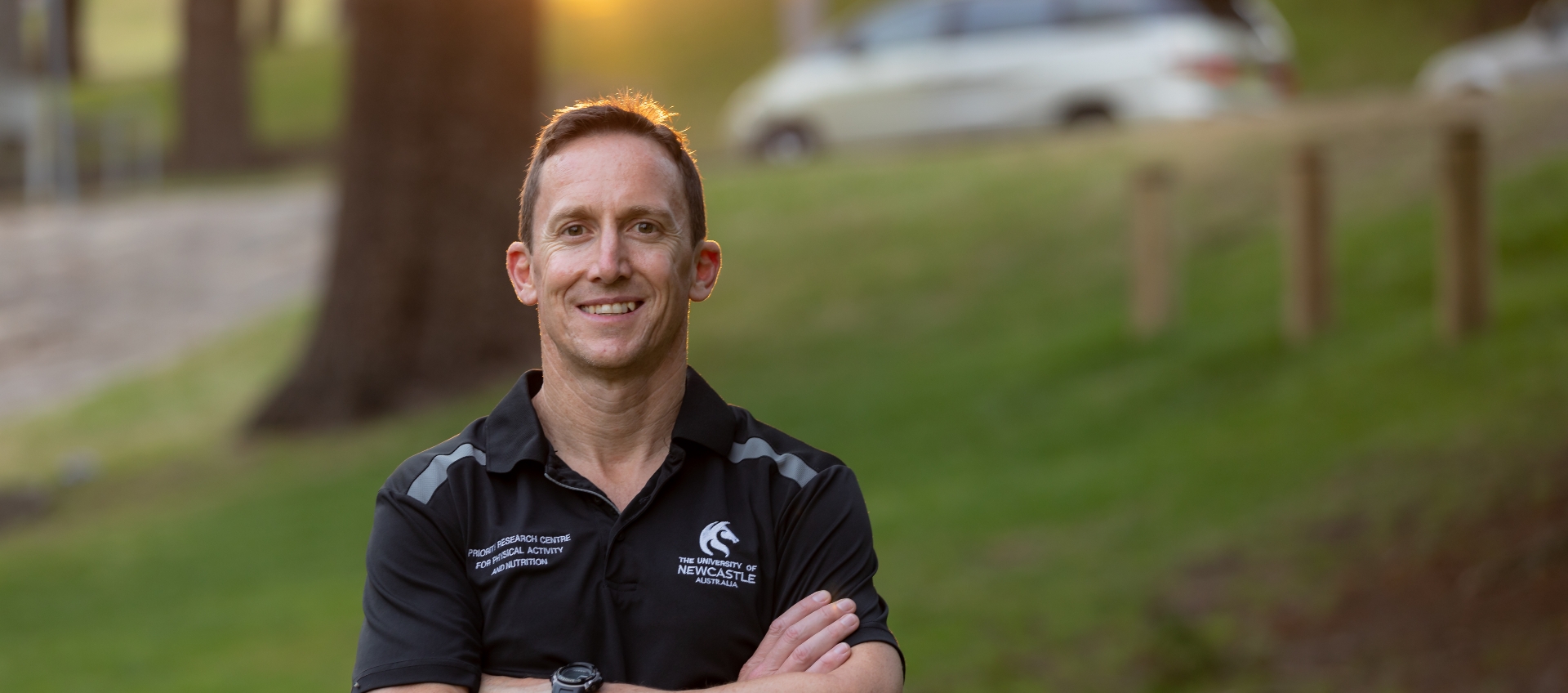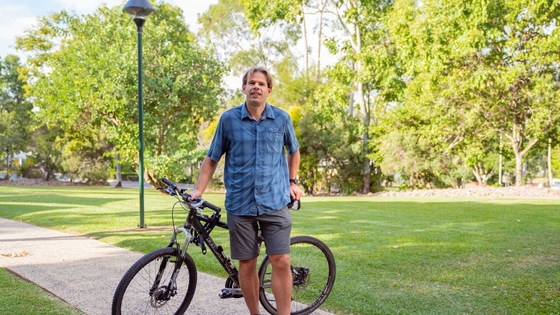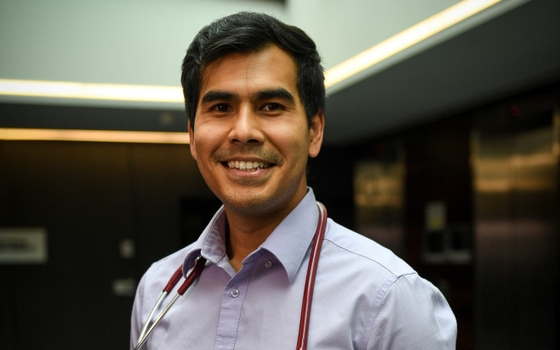
Q&A with Professor Philip Morgan
Improving the heart health of Aboriginal and Torres Strait Islander families living on Darkinjung Country – Healthy Dads, Healthy Mob ‘biya yadha gudjagang yadha
Professor Philip Morgan is a Vanguard Grant recipient based at The University of Newcastle. Professor Morgan is also a co-deputy director of the Centre for Active Living and Learning at The University of Newcastle.
His research focuses on the role fathers play in influencing their children's health behaviours.
This project aims to adapt the successful program Healthy Dads, Healthy Kids, to make it culturally appropriate and engaging for Aboriginal and Torres Strait Islander families living on Darkinjung Country.
Successful application of this program will work to reduce heart disease risk in Aboriginal and Torres Strait Islander communities.
What are you currently researching?
Heart disease is a leading cause of early deaths in Aboriginal and Torres Strait Islander communities. To reduce the impact of health disadvantage that affects multiple generations, culturally appropriate programs designed to improve the health and wellbeing of Aboriginal and Torres Strait Islander fathers and children are urgently needed.
Healthy Dads, Healthy Kids (HDHK) is an evidence-based, lifestyle program for fathers and children developed by our research team at the University of Newcastle. HDHK has been successfully trialled and community effectiveness has been reported.
In this project, we will work with the Eleanor Duncan Aboriginal Services, local Aboriginal and Torres Strait Islander families and a Cultural Affirmation Panel to adapt the HDHK program, making it culturally appropriate and engaging for Aboriginal and Torres Strait Islander families living on Darkinjung Country. In addition, Chief Investigators on this project include; Associate Professor Kathleen Butler, Head of the Wollotuka institute and a proud Aboriginal woman, belonging to the Bundjalung and Worimi peoples of coastal NSW; and Mr Nathan Towney Pro Vice-Chancellor - Indigenous Strategy and Leadership at the University of Newcastle, and a proud Wiradjuri man from Wellington, NSW. Mr Jake MacDonald, Cultural Capability Partner in the Office of Indigenous Strategy and Leadership at the University, is a PhD student on this project. The adapted version of the HDHK program will be called Healthy Dads, Healthy Mob ‘biya yadha gudjagang yadha’. We will then complete a feasibility trial with Aboriginal and Torres Strait Islander families living on Darkinjung Country to evaluate the program.
What difference will your research make to people’s cardiovascular health in Australia?
This project will build on our pioneering HDHK program, which has been evaluated through a number of trials. All trials demonstrated meaningful effects on heart disease risk factors, including physical activity, diet and weight, in both fathers and children. We predict that this project can have similar, meaningful effects.
By designing a culturally appropriate, accessible and engaging program that will help to improve heart disease risk factors in Aboriginal and Torres Strait Islander fathers and their children, we aim to achieve widespread, lasting improvements in Aboriginal and Torres Strait Islander heart health. In addition to the potential long-term health benefits, we are also working out strategies for adaption of the program to local conditions and cultural norms, which will allow us to extend delivery of Healthy Dads, Healthy Mob across other remote and isolated communities.
What motivated you to do your research?
Heart disease is a major contributor to the early death of Aboriginal and Torres Strait Islander people. There is an urgent need for culturally appropriate and engaging heart disease prevention programs that target Aboriginal and Torres Strait Islander families to support their health throughout the generations.
In addition, fathers have a unique and powerful influence on their children’s weight and health behaviours from a young age. Despite this, there is a lack of representation of fathers in children's health research and community programs.
This project seeks to build on our earlier, successful research which has used evidence-based parenting strategies to help fathers and their families adopt healthier lifestyles.
Are there any achievements or discoveries from the past year you can share with us?
The Healthy Dads, Healthy Kids (HDHK) program has secured international funding recently, with exciting collaborations in 2022 to deliver the program outside of Australia. The program is being adapted for Hispanic families in the U.S. and German families. It has also been adapted and delivered to fathers in Scottish prisons. In collaboration with Eleanor Duncan Aboriginal Services, we have established a Cultural Affirmation Panel and a Community Panel. We have consulted with these panels to guide the cultural adaptation of the Healthy Dads Healthy Kids program, to ensure that it is culturally appropriate and engaging for families living on Darkinjung Country.
What role has Heart Foundation funding had in your career journey?
The generous funding received from the Heart Foundation will assist our team to test the effectiveness and practicality of a culturally adapted version of our award-winning 'Healthy Dads Healthy Kids' program for Aboriginal and Torres Strait Islander families living on Darkinjung Country. Should the project show similar improvements in heart health to our earlier research, this evidence will be vital to inform and support a larger-scale evaluation in different communities. This will support us to achieve our aim of widespread, lasting improvements in the heart health of Aboriginal and Torres Strait Islander communities.
Do you have a message for Heart Foundation supporters?
I am extremely grateful to the Heart Foundation donors and supporters for funding this project to improve the health of Aboriginal and Torres Strait Islander families. We have an experienced team of researchers, collaborating with local Aboriginal and Torres Strait Islander leaders who are greatly respected in the community.
We look forward to the health improvements that this project hopes to bring to fathers/father-figures and their children.
You might also be interested in...

Q&A with Dr Nathan Palpant
Deadly spider venom offers hope to people having a heart attack

Q&A with Professor Corneel Vandelanotte
Developing and delivering physical activity interventions using chat-bots

Q&A with Dr Hashrul Rashid
Finding ways to detect leaflet thrombosis (LT) earlier to improve health outcomes.
Last updated09 January 2026